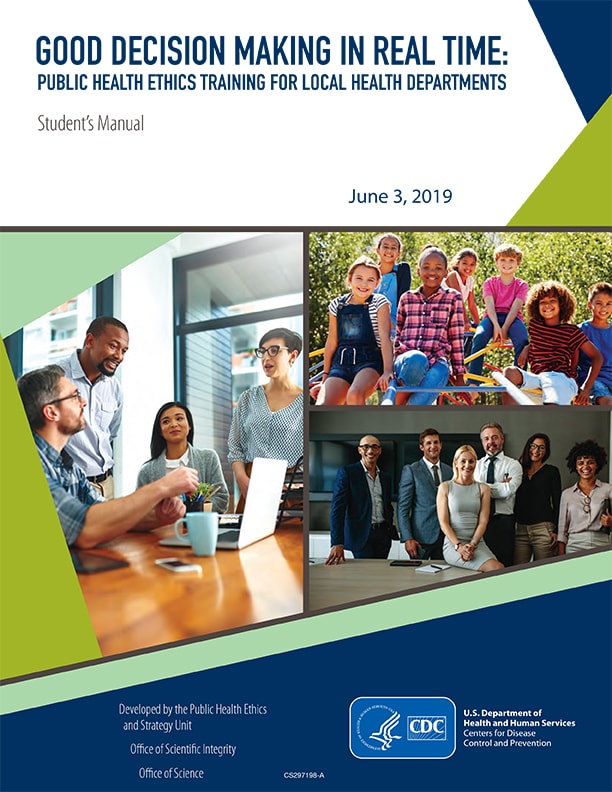Public Health Ethics Training Materials
Good Decision Making in Real Time: Public Health Ethics Training for Local Health Departments

As part of CDC’s ongoing efforts to support state and local health departments, the Public Health Ethics Unit has developed a training manual to be used as a tool to strengthen public health ethics capacity at the local level. The manual includes an introduction to public health ethics, relevant case studies, suggestions for integrating ethics into health departments, and additional resources. The Student version of the manual may be downloaded here; the Facilitator version is available upon request.
Download the Student Manual
To request a copy of the Facilitator Manual, please email phethics@cdc.gov.
Web-on-Demand e-Learning Module
GOOD DECISION MAKING IN REAL TIME: PRACTICAL PUBLIC HEALTH ETHICS FOR LOCAL HEALTH OFFICIALS
The Centers for Disease Control and Prevention (CDC) and the National Association of County and City Health Officials (NACCHO) announce the availability of a Web-on-Demand e-Learning module, Good Decision Making in Real Time: Practical Public Health Ethics for Local Health Officials. The Centers for Disease Control and Prevention (CDC) and the National Association of County and City Health Officials (NACCHO) announce the availability of a Web-on-Demand e-Learning module, Good Decision Making in Real Time: Practical Public Health Ethics for Local Health Officials.
PROGRAM DESCRIPTION: This Web-on-demand course provides training on the basics of public health ethics and the process of ethical analysis and describes tools and resources for addressing ethical challenges that commonly arise in the practice of public health. The course also explores the complementary nature of public health law and public health ethics, reviews approaches to implementing public health ethics in health departments and presents a case study to illustrate the steps of applying an ethical analysis to a real-life case scenario.
COUSE OBJECTIVES: At the conclusion of the session, the participant will be able to:
- List 3 ways to define the field of public health ethics.
- Describe 2 ways public health ethics and law can work together to address ethical challenges.
- Describe 3 resources for helping public health officials make ethically informed choices.
- List 2 specific ways to integrate ethical considerations into public health decision-making.
- Explore multiple solutions by organizing, prioritizing, and defending each possible solution.
FACULTY/CREDENTIALS:
Drue Barrett, PhD; Lead, Public Health Ethics and Strategy Unit; Office of Scientific Integrity, Office of Science, Centers for Disease Control and Prevention
Ruth Gaare Bernheim, JD, MPH; Chair, Department of Public Health Sciences, School of Medicine; Co-Director, The Institute for Practical Ethics and Public Life; Professor of Public Health Sciences, Medicine, and Family Medicine; University of Virginia School of Medicine
Alan Melnick, MD, MPH, CPH; Director and Health Officer; Clark County Public Health, Washington
Leonard Ortmann, PhD; Senior Ethics Consultant; Public Health Ethics and Strategy Unit, Office of Scientific Integrity, Office of Science, Centers for Disease Control and Prevention
Matthew Penn, JD, MLIS; Director, Public Health Law Program; Office for State, Tribal, Local, and Territorial Support, Centers for Disease Control and Prevention
COURSE ACCESS: Access the course at https://www.pathlms.com/naccho/courses/282
CONTACT INFORMATION: Contact OSItraining@cdc.gov for questions about this course.
Public Health Ethics Case Repository
Below are additional public health ethics cases that can be used in conjunction with the training manual – Good Decision Making in Real Time: Public Health Ethics Training for Local Health Departments:
- Emergency Preparedness: Impact of Regulatory Compliance and Resource Allocation Decisions on Laboratory Capacity
- Ensuring Biosafety/Biosecurity during a Public Health Emergency
- Short-course Zidovudine Compared to What? A Trial to Prevent Mother-to-Infant HIV Transmission
- Unsafe Injections: Duty to Warn?
- Use of Restraint and Physical Force by First Responders: Duty to Investigate and Educate?
- Ethical Considerations for Allocating Medical Countermeasures in an Anthrax Incident
- Policies for Restricting Use of Electronic Nicotine Delivery Systems (ENDS) in Indoor Public Spaces
Public Health Ethics Casebook
Public Health Ethics: Cases Spanning the Globe (2016). DH Barrett, LW Ortmann, A Dawson, C Saenz, A Reis, G Bolan (Eds.). Springer Open.
This open access book includes 40 cases that highlight a broad range of ethical issues and dilemmas that arise in the practice of public health. The casebook begins with an introduction to the basic concepts of public health ethics and describes important events that shaped the practice of public health. The cases are organized into chapters that discuss the following topics:
- Resource allocation and priority setting
- Disease prevention and control
- Chronic disease prevention and health promotion
- Environmental and occupational public health
- Vulnerability and marginalized populations
- International collaboration for global public health
- Public health research
You can access this book free of charge at Public Health Ethics: Cases Spanning the Globe.
Open Access Narrative Public Health Ethics Book
Narrative Ethics in Public Health: The Value of Stories (2022)., DH Barrett, LW Ortmann, SA Larson (Eds). Springer Open.
This Open Access book illustrates the power of stories to illuminate ethical concerns that arise in public health. It complements epidemiological or surveillance evidence and reveals stakeholder perspectives crucial for public health practitioners to develop effective and ethical public health interventions. The book contains 14 chapters that present stories about public health problems and challenges. The stories range from first person narratives of both practitioners and citizens, to analysis of published short stories. The problems and challenges the stories address include justice concerns, surveillance and stigma, community values and the value of community, trust and the value of information, and freedom and responsibility. Specific topics include resource allocation, balancing individual liberty and the need to protect the community from health threats, and the health impact of trauma, addiction, obesity and health disparities.
You can access this book free of charge at Narrative Ethics in Public Health: The Value of Stories